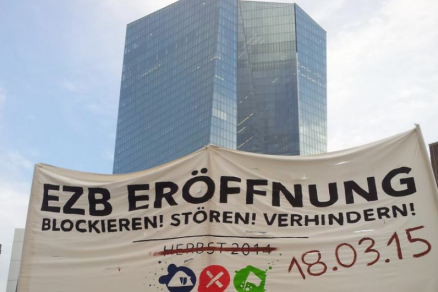Utopia today consists in the system going on with a few cosmetic changes. The current crisis has long ceased to be a local crisis. In the true sense of the word, it is global. It is and end without an end, an indeterminate affront, set to perpetuate. Beyond an attempt to make individual arrangements as best as one can, even if this be through a racist retraction of solidarity, the system no longer contains a credible promise of an exit or solution. And so the crisis is made into a permanent state of emergency. The pervasive compliance in this country is not least a result of this hopelessness.
This new European economy is also a crisis of bourgeois democracy, and in this it is a crisis of our everyday and life world. The commodity economy becomes more and more authoritarian, the disaster militarised, and with today’s bank union, the great fatherland coalition in Berlin puts an end to the ‘junk’ of small states on the European financial markets. Now, then, at the very latest, the ECB becomes a “committee” tasked with managing the “common business” of the European bourgeoisie, making it part of “modern state violence” (Marx) - but a part that is no longer based on any democratic control. The ruling politics is the imperial crisis service, regulating new disavowals and enclosing existing resistance.
In its various spheres of power and organisation, this system is more than just a government, bank or military. It is everything together and nothing for itself. And simultaneously, everywhere, it falls apart, also and precisely because it no longer directs a project capable of establishing hegemony that relies on the agreement of many. But if behind every fascism a failed revolution does lie (Benjamin), then the opportunities latent in this crisis should be sought out now and not left behind unused.
Power is increasingly a complex combining the political, the economic the medial, free of democratic control and any genuine participation. Not only does it have a centre, it makes all who (must) relate to it - and therefore this includes ourselves - to participants and accomplices. But there are hubs at which power symbolically and actually is concentrated - and one of these hubs is the ECB.
Power doesn’t speak. In the end it will only ever grin at us. And when this isn’t enough, which, luckily, is always the case, it hits. Power, this is our point, functions atop a sheet of ice which appears to be stable but in the end is always thin. For this reason the way to be realistic today opens where we contemplate that which in the coordinates of the system must appear to be impossible: that the ice can break, maybe even tomorrow, and even if it is initially only for a moment. March 18 could be such a moment. The idea is very simple. It begins with the unstoppable power of the strike - the word strike taken in a broader social sense with the city in mind. It is possible to make the wheels stop turning. The everyday cage of grey, its pulse, its routine can be blown. We don’t only know this from the recent history of Blockupy: in just these past months others have taken up the long history of the strike. Many are around to remind us of the strike as social and urban strike.
March 18, 1871 was the start of the uprising of the Paris Commune. Like hundreds of thousands of others who have remembered what is possible when people assemble at the plazas in the middle of the city, we too will seek out opportunities. These are both very old and very new experiences at once. Let us take the time to test them. Let us prevent the opening of the ECB by interrupting its business and the economic activity of the city. On March 18, 2015, a Wednesday, and of course initially only this Wednesday. All of us together. The opportunity stands before us. The time of preparation has already begun.
December 2014
Interventionistische Linke

